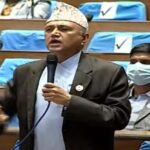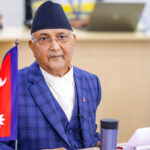# Prem Sagar Poudel
Nepal, Finalizing State Partnership Program Agreement !
Nepal’s participation in the US-led State Partnership Program (SPP) has reached its final stage. US Army Pacific Chief of Staff Charles A. Flynn, who is on a four-day visit to Nepal, Nepal has reached the final stage of the SPP agreement after a phased discussion with Flynn by Nepalese officials.

The agreement will be signed during Prime Minister Sher Bahadur Deuba’s visit to the United States. Probably, Prime Minister Deuba will fly to the United States on 27 Ashadh. Prime Minister Deuba is leaving for the United States to attend the second series of the Democracy Summit hosted by US President Joe Biden.
Earlier, Prime Minister Deuba had attended the summit with Taiwanese leaders on December 9 and 10, 2021. The event, held at wave base, was attended by Taiwan’s Ambassador to the United States Hsiao Bi-Khim and Digital Minister Audrey Tang. This was an American attempt to make Taiwan an independent nation in the international arena.
The United States has been trying to get Taiwanese officials involved in the second edition. It seems that the United States is also seeking Nepal’s support in the idea of introducing Taiwan as an independent nation in the international arena. Nepal’s support for Ukraine can be taken as a link in this chain. The Americans are now trying to institutionalize the analysis that Nepal is facing security challenges due to the Ukraine war.
They argue that with such an analysis institutionalized, it would be easier to increase military intervention in Nepal. This sentiment is now being represented by Nepal Army Chief Prabhuram Sharma. He has already given a public statement in a program organized on 23 Jeshth that Nepal is facing international security challenges. That I have already mentioned in the previous article.
Message from the Fohora Durbar:
Speaking at a program organized at Fohora Durbar in Kathmandu on 28 Jeshth, General Flynn said that Nepal is a ‘land power’. In an interaction with Nepal’s security experts and former security personnel, General Flynn’s views highlighted the importance of Nepal’s need for the United States.
General Flynn said, ‘America is the glue right now. It connects the world. It connects the Indo-Pacific and Asia-Pacific regions. There are 36 countries within the Indo-Pacific. This area is important territory for the United States. The relationship between the US military and the Nepal Army is important for the prosperity of both countries.’
In his half-hour speech, General Flynn spoke on the importance of the Nepal Army. He expressed the view that the United States would assist in the development of the professional capabilities of the Nepal Army. In his speech, it was clear that the Nepal Army was ready to cooperate with the US Army. This support is not like the past, it appears to be moving forward with the signing of the US State Partnership Program (SPP).
Considering the possibility of military cooperation being opposed in Nepal, efforts have been made to promote it in the name of ‘cooperation for peace’. The basic concept of the speech given by General Flynn at Fohora Durbar seems to be similar to the speech given by Nepal Army Chief Sharma on 23 Jeshth. Sharma’s speech said: ‘Nepal is in the grip of an international security threat.’
General Flynn’s speech states: “There is a need for cooperation between Nepal and the US military in overcoming that security challenge. This cooperation is necessary in the field of world peace.” In other words, there is no need for a strategically capable country like the United States to declare what kind of peace sector it is trying to work with Nepal’s army. As many issues are clear, cooperation between the Nepalese and US forces is only one part of the Indo-Pacific strategy. In this journey, the Nepal Army seems to be moving forward under the cover of peace.
Prime Minister Deuba will sign the agreement during his visit to the United States as Minister of Defense. Prior to that, the agreement will be finalized during the visit of Nepal Army Chief Sharma. During his address, General Flynn made it clear that “natural training assistance with the Nepal Army in high mountainous areas.” In other words, the Americans need the high mountainous region of Nepal more than the Nepalese army.
General Flynn’s remarks seem to clarify two issues. First, Nepal is moving towards an Indo-Pacific strategy through SPP. Secondly, the center of this strategy will be the high mountainous region of Nepal. The United States appears to be considering training more military camps in the area. For that, General Flynn had planned to go on a mountain flight on 28th Jeshth. However, due to inclement weather, his thinking did not come true.
Basis for Policy:
US President Joe Biden unveiled the latest concept of the Indo-Pacific Strategy at the Quad Leader Summit. The 18-page document, released on September 24, 2021, is part of the Indo-Pacific Strategy of the United States. That is, what the United States wants in the Indo-Pacific region is covered in the document. It is also the Indo-Pacific Strategic Paper. Based on this strategy, the United States intends to focus its activities in the Indo-Pacific region.
Following the strategy unveiled by President Biden, the US military, particularly the Indo-Pacific Command, must develop policies based on this strategy. The practical transformation of the strategy is possible only through this strategy. This task is the responsibility of Indo Pacific Command. The Indo-Pacific Command’s work on the issue of promoting Indo-Pacific security, which is in point 4 of the strategy, is specifically for the Indo-Pacific Command. Relevant bodies will formulate strategies on other issues. In the third point of the strategy, USAID formulates a strategy for the prosperity of the Indo-Pacific region. Based on the same strategy, US assistance seems to be mobilized in the Indo-Pacific region.
This is the Indo-Pacific Command’s defense policy. The United States now appears to be seeking clarification on the role of Indo-Pacific countries in security policy. In particular, the implementation of the policy depends on the assistance provided by India and Nepal. India has an important role to play in South Asia. So General Flynn set out on a visit to India.
India has not yet formally decided on the Indo-Pacific strategy. However, looking at the recent news coverage in the Indian media, it seems that India is trying to clarify some issues with the US. In particular, the issue of open entry of goods produced in India into the US market is linked to India’s reputation. India seems to be seeking clarity not only on market issues with the US but also on India’s role in the strategy. That is why General Flynn flew to Nepal because they had to do more for India than expected.
General Flynn, who left his plane in Delhi and came to Nepal from Indico Airlines, seems to be trying to clarify how Nepal supports the strategy. General Flynn is thinking of formulating the security policy for the region based on Nepal’s assistance. General Flynn appears to have visited the region at the urging of President Biden, to clarify the role of the countries in the strategy. Therefore, this visit is understood to be the basis for formulating Indo-Pacific security policy. From Nepal, General Flynn returned to the United States with great enthusiasm because he got better than expected.
Nepal’s support for Taiwan:
Another reason for General Flynn’s visit to Nepal was to seek Nepal’s support in the US plan to declare Taiwan an independent nation, just as Nepal supported Ukraine under US influence. Chinese Defense Minister Wei Fenghe and US Secretary of Defense Lloyd Austin met during the three-day Sangrila Dialogue held in Singapore on 29 Jeshth.
During the meeting, Chinese Defense Minister Wei said that China was ready to go to war if Taiwan was declared independent from the Chinese mainland. Wei said the Chinese military would spare no effort to fight the war and destroy all efforts for Taiwan’s independence at any cost. After China made it clear that there would be a war for Taiwan, Austin said the United States did not want a war in the Indo-Pacific region.
However, Austin also expressed his commitment to continue to support their partners and allies. This means that the United States will not back down on Taiwan under any circumstances. The United States, which has been supplying modern weapons to Taiwan, seems to be trying to persuade countries in the region, including Nepal, to stand up for Taiwan’s independence. It is understood that the matter about Taiwan was discussed with Prime Minister Deuba also during the visit.
General Flynn sought confidence that Nepal’s support would be on Taiwan’s side in declaring Taiwan an independent state. As Nepal is now in a position to support all the programs put forward by the United States, it cannot be said that Nepal will not be with the Americans regarding Taiwan, contrary to the one-China policy. On 29 Jeshth, General Flynn visited the Nepal Army’s Birendra Peacekeeping Training Center in Panchkhal and the Army Command and Staff College in Shivapuri. In a meeting with President Vidyadevi Bhandari and Deuba, General Flynn urged them to support the strategy put forward by the Nepal Army in the Indo-Pacific region.
During this visit, the United States seemed to have faith in the Nepal Army. Therefore, during his stay in Nepal, General Flynn spent a long time close to the Nepal Army. He was most interested in cooperating with the army. Along with this interest, the agenda of the visit to the United States started by Chief of the Nepal Army Sharma was also discussed. Therefore, the activism of the Nepal Army has increased regarding the visit of Army Chief Sharma and Prime Minister Deuba to the United States.
Speaking in the House of Representatives on 29 Jeshth, UML MP Pradip Gyawali demanded that the House must be informed about the Prime Minister’s visit to the United States. He said: “The Nepal Army is taking the lead in this visit more than the Ministry of Foreign Affairs. So, is this visit of the Prime Minister taking place in the post of the Prime Minister or the Minister of Defense?’
Earlier, Dev Prasad Gurung, chief whip of the CPN-Maoist, had demanded the cancellation of the visit of the Prime Minister and the Chief of Army Staff to the United States on 26 Jeshth. He said: “I urge you to postpone this visit in view of national security concerns.”
General Flynn, who returned to the United States from Nepal on 29 Jeshth, did not hesitate to state that the US Army was ready to work with the Nepal Army. Overall, this visit seems to have put Nepal in further crisis. Opposition MPs are not in favor of the visit. Gurung, the chief whip of the ruling Maoist party, has warned the government not to be too close to the United States. Apart from this, another UML leader and MP Dr. Bhim Rawal, Nepal Mazdoor Kisan Party’s leader and MP Prem Suwal and Maoist center leader Giriraj Mani Pokhrel have already raised the issue of involving in the American security umbrella by Nepal in the parliament.
The government is considering ending the budget session by passing the citizenship bill. As the date of the general election will be announced after the budget session, it is not possible to discuss such issues before Magh in the House of Representatives of Nepal. This will make it easier for the government to finalize the agreement with the United States.


